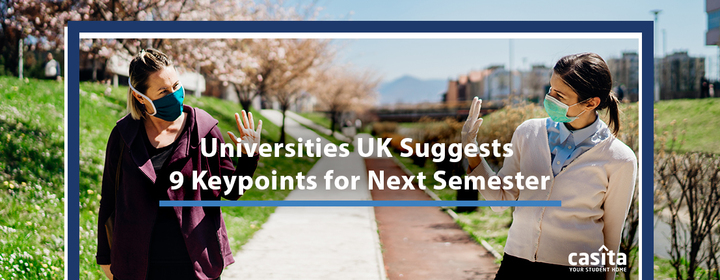Universities UK Suggests 9 Keypoints for Next Semester
By Casita Team
|
10 June, 2020
Share

Updated at:
Published at:
By Casita Team
Universities UK Suggests 9 Keypoints for Next Semester
By Casita Team
|
10 June, 2020
Share

The Universities UK organisation has proposed a plan to emerge from the restrictions imposed by the Covid-19 situation while still maintaining the safety of university, students and staff. On 3 June 2020, the organisation published a paper outlining a plan to reorganise face-to-face teaching and the interaction between students on campuses.
Professor Julia Buckingham, Universities UK's President and vice-chancellor of Brunel University, explained that most universities would not fully move to online lectures. Instead, there will be a combination of online and small face-to-face tutorials to organise the interaction on campuses in line with government guidance on physical distancing.
"Students want to have a university experience that is as close as possible to the one they were expecting when they filled their application forms in the autumn," Buckingham said. "We will deliver in-person teaching and learning wherever possible, accompanied by online lectures and digitally based materials when required."
The publication drafts nine principles for universities to consider while trying to adapt their campus and lecture halls to apply social distancing rules. These principles are not rules to be followed; rather, they are key points that universities are expected to examine to ensure the safety of their students. Alongside these principles, universities are advised to follow the official government and public health advice and case studies published by experienced health professionals.
The first principle prioritises the health, safety and wellbeing of students, staff and visitors. When considering any decision related to easing restrictions, each university should have an action-plan ready to ensure the implementation of public health requirements. It should be responsive and adaptable to any risk imposed by Covid-19. There should be an assessment of the impact of activities conducted in the university to spot any risk. Also, the university should maintain a communication line with students and staff to stress the importance of public health guidance.
The second principle highlights the effectiveness of changing the layout and infrastructure of universities per public health advice, including guidelines on social distancing. Each university ought to promote social distancing regulations throughout communal spaces in the university such as classrooms, laboratories and libraries. An example of this would be placing floor markings to demonstrate the recommended distance and wall signs to limit the access of people at certain times.
The third principle takes into account the learning process by ensuring the availability of flexible teaching, learning and assessment methods. The ultimate goal of this principle is to guarantee students a high-quality experience and support to achieve effective education in a safe environment. The universities should establish in-person teaching in accordance with the guidelines on social distancing. Whenever there is a possibility of making use of online facilities to deliver a course, it is advisable to implement them and address any lack of digital access for their students. The varying adaptation of methods should consider the best steps to cause less disruption to students.
The welfare and mental health needs of students and staff is the focus of the fourth principle. Each educational institution should provide mental health and wellbeing support services to tackle loneliness or isolation. There could be alternative ways in line with public health and social distancing; offering online video conferencing for counselling appointments or over the phone.
The fifth principle focuses on the effective processes to welcome and support international students and staff in the self-isolation period. Student accommodation should be available to complete the period with clarification of the legal outcome of breaking the self-isolation. Universities should consider providing support for those international students in the UK whose arrival is delayed as well. There should be different types of orientation programmes to ensure the inclusion of all international students.
Universities UK suggests in the sixth principle ways to organise hygiene and cleaning protocols. It addresses the introduction of hygiene stations for handwashing and hand sanitising. They should highlight the high-touch areas and focus on improving its cleaning and disinfecting protocol ( e.g. door handles, light switches, etc.). Last but not least, there should be barriers in cafes and libraries to protect students and staff.
The educational institutions should implement safety measures for research to be conducted. This seventh principle outlines the significance of following government guidance to protect researchers in laboratories. The guidelines consider a change in the infrastructure to meet the social distance requirements and the safety of the shared equipment in research facilities.
The eighth principle in the plan is about the communication and consultation between students and staff and the recognised trade unions to ensure the transition from lockdown to the 'new normal'. Universities should encourage a line of communication to deliver assessment results and offer a channel for students and staff to provide feedback.
The last principle strengthens the importance of engagement and communication with civic and local partners and community groups. Local concerns should be addressed regarding emerging from lockdown and universities should reassure the wider community that safety remains the priority.
The detailed plan is available on the website of the Universities UK alongside multiple useful resources and publications in the final section.
